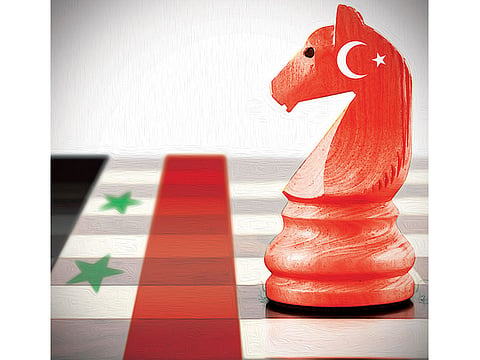Setting the stage for a military intervention in Syria
Erdogan’s intervention in the war-torn nation has acquired a strategic depth

After four years of discussions and hesitation, Turkey decided to intervene militarily in Syrian. On August 24, 2016, Turkish tanks and special forces, aided by air cover, went inside Syrian territories to back attempts by Syrian opposition forces to take the border town of Jarablus from Daesh (the self-proclaimed Islamic State of Iraq and the Levant). Immediately thereafter, Turkey issued an ultimatum to the Kurdish People’s Protection Units (YPG), the Syrian branch of the Kurdistan Workers’ Party (PKK) — giving them three days to pull their forces from the strategically important town of Manbij and return to the east bank of the Euphrates river. The Turkish move left many observers perplexed, wondering what had spurred Turkey to intervene directly in Syria after years of hesitation and indecision.
In fact, since the beginning of the Syrian crisis in March 2011, there have been strong incentives for Turkey to intervene militarily in Syria; but the Turkish army was resisting the temptation. The army thought that any intervention in Syria with at least a political cover from Nato and particularly the United States will be a recipe for disaster. The failed coup attempt provided Turkish President Recep Tayyip Erdogan with the opportunity to purge the army and assert his control over it. The recent military operation in Syria is significant evidence that the Turkish government is now in a better position to command the army and make it toe the government’s line.
Making use of popular discontent at the growing security threats posed by Daesh and PKK, the Turkish government launched a military operation aimed at stopping the campaign of bomb attacks on Turkish soil, orchestrated from inside Syria.
Losing vital support
To overcome US reluctance to support its military intervention in Syria, the Turkish government went as far as to threatening to reconsider its security and military alliance with Washington. Reluctant to lose the vital support of Turkey in the confrontation with Daesh, the US chose to give Turkey a free hand to take on both Daesh and the Kurds in areas to the west of the Euphrates. Notably, Turkey’s military operation began the same morning when US Vice-President Joe Biden arrived in Turkey, calling upon the YPG to withdraw to the east of the Euphrates, lest they should lose the American support they had received to the west of the river while ousting Daesh from Manbij. The lifting of the US veto on Turkish intervention in Syria thus had a major role in pushing Turkey into action against both Daesh and the YPG, although Washington still has reservations about the creation of a safe haven in northern Syria, as per Ankara’s demands.
Ankara has also secured a Russian approval for its intervention in Syria. On September 30, 2015, Russian military intervention in Syria ended the chances for Turkey to create a buffer zone in northern Syria, something it had long tried to persuade Washington of. The downing of a Russian jet on November 24, 2015, closed Syrian airspace off to Turkish planes. Although Turkey continued to bomb YPG forces with artillery fire to prevent them from being deployed along the whole of its southern border, particularly to the west of the Euphrates from Afrin towards A’zaz and the areas controlled by the Syrian opposition, the results of the bombings were limited since the Kurds, with joint American-Russian support, maintained control over more territory — be it east or west of the Euphrates.
In signalling an end to the rupture with Russia, especially after the failed coup, Erdogan was able to neutralise Russia in the conflict with the Kurds. Moscow closed the bureau of the Kurdish Democratic Union Party (the Syrian branch of the PKK), which Ankara deems a terrorist outfit. Until then, the Kremlin had allowed it to open a bureau in Moscow at the height of the crisis caused by the downing of the Russian jet, as well as providing political and military support to the party in Syria and even within Turkey itself.
In tandem with mending relations with Russia, Turkey was also moving to patch things up with Iran — Syria being the fundamental sticking point between them. Recent Russian and American pronouncements about the possible division of Syria, or at the minimum the creation of a federal arrangement, where the Kurds will enjoy considerable autonomy, caused anxiety in both Ankara and Tehran and led both to coordinate efforts to prevent the creation of a Kurdish state in the north of Syria.
Tehran escalated its attacks against Iranian Kurdish Democratic Party and other Kurdish factions based in northern Iraq. This explains the absence of any negative Iranian reaction to Turkey’s direct military involvement in northern Syria, even though Tehran usually has no qualms about voicing its irritation over Turkish policies in Syria and has long authorised its allies to confront Turkey over any military intervention, be it in Syria or in Iraq.
By this, Turkey has set the stage for military intervention in Syria and has ensured the tacit approval of the most important actors in the Syrian conflict.
Dr Marwan Kabalan is a Syrian academic and writer.



